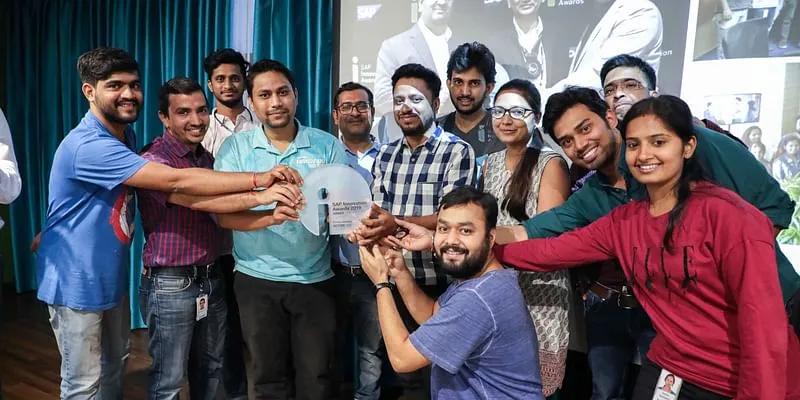Meet the NIT grad and software developer who built a Rs 103 Cr revenue enterprise applications company
Sachin Verma started Incture Technologies in Bengaluru in 2006. Today, Incture has the largest portfolio of digital enterprise applications for SAP customers. It has offices in Europe, Singapore, Thailand, Australia, Qatar, Dubai, Canada, and the US, and a team strength of around 500 employees.
During his six years working in SAP headquarters in Germany, NIT Warangal graduate Sachin Verma noticed a business opportunity in the enterprise applications market.
The software developer saw a need for building digital applications that addressed specific business requirements and whitespaces, and filled the gap between the enterprise solutions that customers required and those that were being built.
A one-size-fits-all approach didn't work; enterprise customers had unique requirements and needed to adopt software solutions and applications at speed and at scale.
“There was a challenge in building unified solutions to address distinct business needs. My experience with enterprise product development at SAP Germany helped me realise that enterprise product architecture required harmonisation, which digital applications could address. There was clearly a need for a solution to address this harmonisation and plug the gap,” he tells SMBStory in an exclusive interview.
This inspired Sachin to come back to India, leverage his SAP experience, and start his own business. In 2006, he invested Rs 50 lakh from his savings to start Incture Technologies in Bengaluru. Sachin and the Incture team began building content-rich enterprise digital applications tailored to address specific business processes and whitespaces.
“Enterprise digital applications or product development became the core business for Incture. In the initial years, we focused on India as our primary market. The market was receptive to our vision and the value proposition that a nimble software provider like Incture was able to provide,” he says.

Sachin Verma, Founder and CEO, Incture Technologies
A rough start
For the first three-to-four years, Sachin and his team were vested in product development. Towards the end of 2008, they started feeling the pinch from the ongoing economic recession. Incture was unable to cover its innovation costs, which was largely funded by customers.
Sachin had two options: look for funding, or choose a different market. “We chose the second option. We targeted South-East Asia and started to work with customers in Taiwan, Indonesia, Malaysia, and Singapore,” he says.
Besides issues with the funding, Sachin and his team faced technology challenges. Incture started to focus on innovating on the mobile stack in 2007. Java on mobile was new at the time as Android and iOS were still nascent. Incture was unable to crack the problems associated with mobile stack platforms and had to abandon its stack after three or four years of development.
Around this time, Sachin shifted from IBM to SAP’s platform stack for building digital applications. “We started to build digital applications, called smart apps, which were ahead of their time. We thought about the need for intelligent applications and technologies five years before the rest of the market,” he says.
Despite facing a tough time explaining the value proposition and concept of digital apps to customers at the time, Sachin’s decision to choose SAP for building applications on its cloud platform paid off in the long run.
“We built over 100 complex digital applications on the SAP Cloud platform for several Fortune 100 companies across the globe. Over the years, building digital applications on SAP Business Technology Platform and go-to-market with SAP became our core business strategy,” Sachin says.
Incture currently has the largest portfolio of digital applications for SAP customers, it claims. It has offices in Europe, Singapore, Thailand, Australia, Qatar, Dubai, Canada, and the US, and a team strength of around 500 employees.
“Our digital applications are built for change, where customers can easily configure the applications for their business processes. Incture is run by a young team with intrapreneurial mindset, who believe in the culture of elevating the experience of customers with product innovation and services," he says.
With this business and operating model, the company recorded a turnover of Rs 103 crore in 2020, it claims. It is now targeting over 7x growth and is looking to touch Rs 700 crore by 2023.

The Incture team at the SAP Innovation Awards 2019
Expansion strategy and future plans
While a 7x growth in just over four years might seem audacious to some, Sachin is confident of achieving the target. He redefines Incture’s market focus every few years, with the intention of not only staying relevant but also expanding at a respectable pace.
In its first few years, Sachin focused on building products from scratch for the Indian market. Using open source software, Incture developed and built the entire technology stack, including the platform, mobile and apps. He says the company has consciously avoided using proprietary programming languages to build its products.
Between 2010 and 2014, Incture focused on South-East Asian as well as African markets. It broadened its services portfolio, developed more smart apps, and strengthened its partnership with SAP.
From 2015 onwards, Incture expanded into North America. "Around this time, a lot of young technical talent joined the company. It was fulfilling to see young engineering talent with five to six years of experience lead million dollar engagements end-to-end, right from technology design, solutioning, customer engagement and commercials to delivery," Sachin says, adding:
“There were no language barriers, and it was easy to do business and work with Fortune 500 companies. This phase was all about building this market from scratch and consolidating it."
Now, in its attempt to expand even further, the company is aiming for similar growth. It is looking to expand its delivery partnership network, especially with technology companies that have between 20 and 200 employees. It’s focusing on companies that want to access larger markets or in need of joining forces with a larger company for synergy in product development and innovation.
“We will share office space, business processes, product know-how, and access to the customer base with these partners. We are targeting to get 15 percent of our revenues from growing this ecosystem of delivery partners based out of India,” he says, adding that Incture will also look for value-driven investors in the later stages of this expansion.
Sachin’s recipe for success revolves around going where his customers are. “We became nomads. We went where our customers were. We chose North America five years ago, built a local team of 25 members to work with SAP and its customers. The North American market did not disappoint us. Currently, it continues to be our largest market. Now, we are building dedicated teams in South-East Asia, Australia, and Europe, and are restarting our business in India,” he says.
The COVID-19 pandemic doesn’t seem to have affected Sachin’s plans, and seems to be another phase of reinvention for the company. Incture is now driving most of its customer and employee engagements digitally. Sachin adds that because Incture is in the digital applications space, demand from SAP and its customers is now increasing.
“This is helping us seed product innovation that can accelerate digital adoption for them. We’ve launched several packaged, bite-sized offerings to address the needs of our customers in the current context,” he says.
Edited by Kanishk Singh









